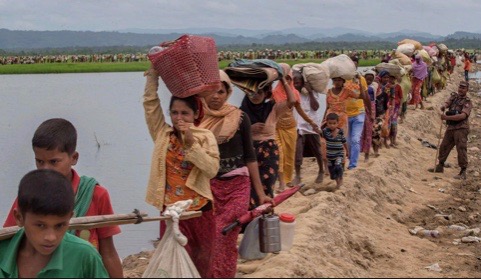SENAY EMMANUEL WRITES—Last weekend, a delegation of Burmese representatives traveled to neighboring Bangladesh to speak with some of the 1.2 million Rohingya refugees situated there. Their goal was to confront this humanitarian crisis and somehow convince these beleaguered refugees to return to Myanmar.
This isn’t the first time the Burmese have paid a visit to the refugee camps. Last year, following a similar visit, Bangladesh and Myanmar signed a repatriation deal, but it ultimately fell through. Not a single refugee agreed to return, primarily due to the lack of safety assurances.
The UN has found the Myanmar government and military responsible for crimes tantamount to genocide against the Rohingya, such as mass killings, gang rape, and arson. Almost all of the refugees have fled to safety to Muslim communities nearby, including in Indonesia, Malaysia, Bangladesh and southern Thailand. The international community, primarily through the UN, has condemned the Burmese government, despite its endless denials of mass killings and ethnic cleansing.
For years, the government of Myanmar has been pressured to facilitate the Rohingyas’ safe return. But this has not yet happened. Now, many believe that the government’s recent visit was more a matter of face-saving than actual diplomacy. Rohingya youth activist Khin Maung has echoed this sentiment, calling the visit propaganda to ease international pressure. The Australian Strategic Policy Institute also agrees, commenting that satellite imagery of the Rakhine state showed “no signs of reconstruction” of destroyed homes and villages. Instead, the government was found to be continuing to destroy villages.
The minority Muslim Rohingyas have been essentially stateless for decades; the Myanmar government does not recognize them as citizens, which is their chief request. But the condition the government has set to guarantee return is for all Rohingyas to apply for National Verification Cards (NVC). The Burma Human Rights Network in fact explains that this identity card does not in effect grant citizenship and would only further marginalize the refugees by identifying them as foreigners. It is no wonder the Rohingya in Bangladesh see the government of Myanmar as untrustworthy and unsafe.
Perhaps the most recent talks could leave observers cautiously optimistic that at least efforts at negotiation are being made and that pressure from the international community continues to have an effect. But without serious and deliberate action regarding the Rohingya humanitarian and refugee crisis, the world will still look at Myanmar with distrust.

